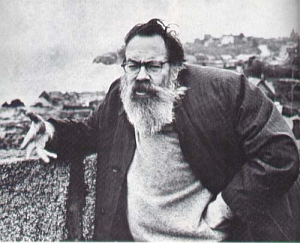By Alessio Zanelli
Indigo Dreams Publishing
ISBN: 978-1-907401-60-2
8.99 British Pounds
Review by Dennis Daly
These poems of Alessio Zanelli scream out for the twilight tonality
and muted landscape of essential beauty. They soften life’s stark edges. At the same time they chronicle the internal
seasons of the human condition. The poet’s art connects these two visions on a
planet filled with ghosts and shadows. The title poem Over Misty Plains serves
as the touchstone. Mankind appears as a species of “tiny“ figures intent on
their little deeds, striving against all
elemental odds. The poem introduces the situation with this question,
Whoever was this tiny man
who used to run against the wind,
through the fog,
In the rain,
on snow-covered paths,
towards the sun—
away from his own shadow?
Notice the seasonal themes of weather and shadow. Zanelli
uses them throughout the book to both frame his visions and define them. The
mist, through which man must struggle, lends beauty to his otherwise alien
context. AT Lucia’s, a poem set in Lombardy,
…The sky opens,
discloses the plain beauty of the Lombard campagna.
Boscageand lea are slowly unmisted in the distance,
toward the laggard sunset.
The air is just bracing,
not bleak or ungentle.
The distance here becomes clearer through the mist, though
it is still misty. At the same time the sun is setting, hiding the clear
outlines, softening. This in-between time births beauty. In a poem entitled
Chasing Specters Out in the Sticks, the hunters race through the woods tracking
down the wraiths of desire and perhaps life-force. The excitement of the hunt
is everything. The conclusion hangs in the balance, but a truly insignificant
balance.
In the poem Getaway Zanelli comments on the aesthetics of
our present environment. He describes an unlovely world, where
Mist and dew
no longer inhabit the dale
Plumes of smoke are the reeds
in the miry oxbows.
The poet then goes on to describe a “snow-hearted” boy, who
now has sand in the lungs
and mineral pitch in the ears.
The acrid smell
of irreparable loss
in the nostrils.
Lord of Winter ices the reader up
in its metaphor. The poet’s creative spirit leaves its burrow to face “sharp-
cheeked” reality. The frozen season preserves the future’s viability and
potential. The awakened poet avers,
As long as your glow resides in my
eyes
however dark it is, to be lord
again
I just need skin as hard as bark,
a few fluttering snowflakes…
The poem, Snow Runner, is nothing
less than a declaration of seasonal preference. The poem starts this way:
You know I like snow
The chilly breath of winter,
Icy roads and rimy trees,
The frosty countryside.
But this winter covering also
covers danger. The poet cautions,
Only, if I’m not back by ten
o’clock,
Please light a candle,
kneel and pray,
forgive me…
In Summer Fog, Zanelli again
softens the piercing sunlight with a fog. Here the fog proves not only an
aesthetic decoration, but a potent natural force inseminating the earth with a
new generation of life. He exults,
Such phenomenal exhalation from
the earth
Betrays the parental nature of the
summer
To the dismal seasons to succeed.
Dreamskimmer is a poem about
internal coldness and a realization which comes with age. It details the shell
of a human being after his dreams slip away and his frantic attempt to recall
those dreams. This is perhaps Zanelli’s saddest poem.
Love brings with it a dependency
of sorts. In his poem Lost the poet shows how destructive that becomes. There
is a nice play on the word “starlet” as the poet’s guiding star. But the end
doesn’t bode well for the lover,
It’s gone
No device
no cognizance,
nobody can help.
I’ve been going awry ever since.
More ghosts in the poem The
Rolling Soul and Mountain Ghost. Only now the ghosts are the chasers instead of
the chase-ees. Those solitary untamed souls that dared the mountain heights are
rolling toward the earth whence they came. The more vital fire carried by the
soul, the more the ghost gets to eat. I think we are talking about the ravages
of time here and the poem’s image strikes
me as honest, if unpleasant.
Knocker of Giants celebrates one
of those carriers of fire, Sir Edmund Hillary. Apparently the poet believes a
few grand souls can beat gravity at least for a time. Zanelli says,
We salute you
knocker of giants,
mindful of how small we are,
how greater than we thought your
feat,
how grand your soul.
Near the end of this book there is
a gem of rhyme and formality entitled A Universe’s Song. The poem takes you to
a place of creation in deep space, where vibrating spheres communicate nothing
and everything. Here’s a bit,
And yet all things there shift
Vibrating spheres of light
Explode and flash adrift
Till fading out of sight.
Don’t read Zanelli’s last poem
titled Witnessing’s End last. It will haunt you into silence with its
meditation on the end of cosmic awareness. It’s that good. Instead try Absolute
Beauty in which the poet wonderfully negates physics and knowledge and praises
the efficaciousness of imagination. The poet puts it this way,
In fact,
one of the three must be true:
there is no beauty in you;
or else—unreality is the most real
of things;
or yet—all those geniuses of
matter, space and time
are nothing but madcap
visionaries.
I can live with that.















































